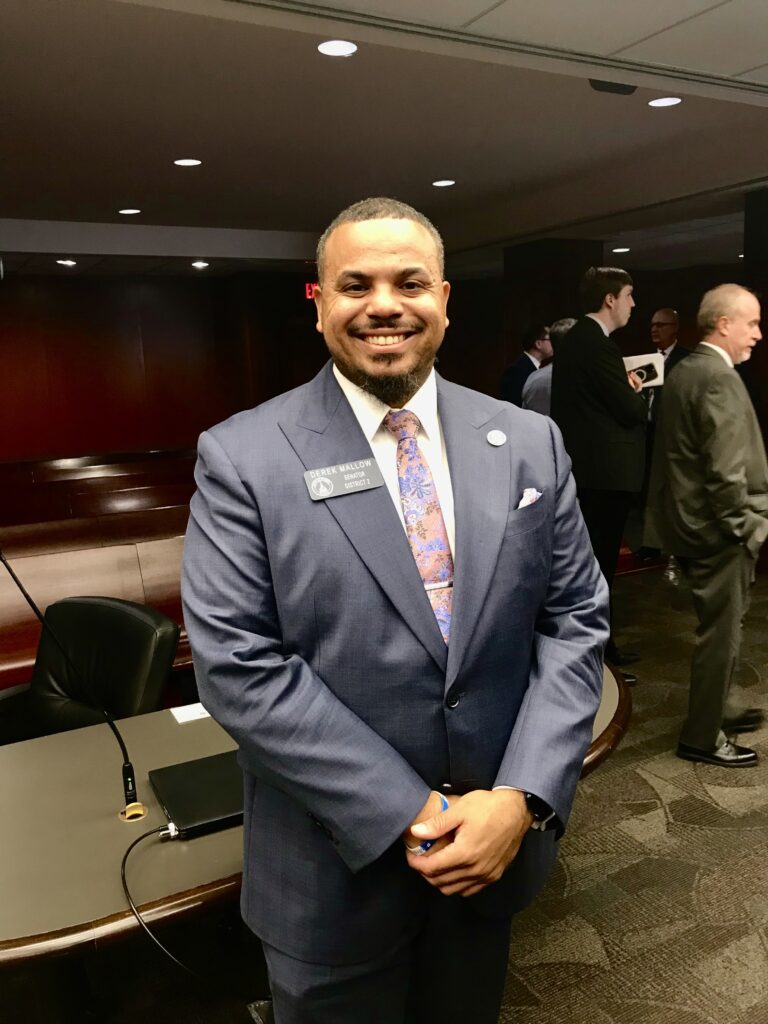
Hapeville’s Young said that on the first day of negotiations last July, just under $4 billion in LOST proceeds through 2032 to be divided between Fulton County and 15 municipalities in Fulton was on the table. Fulton County commissioners proposed reducing the municipalities’ share of collections from 95%, as previously negotiated, to 65%, with 35% now going to the county. If city officials didn’t agree, Young said, “they threatened to go with HOST.” That would mean a loss of $2.3 million for Hapeville, he said. “That’s half of my police force, one of my two fire stations that I can’t fund. It would be a major hole in my budget.” Young said the renegotiation process was “traumatic” and “contentious. … I expect contention over $4 billion, but I don’t expect a zero sum game, a no-win scenario.” Douglasville City Manager Hampton said her team faced the same bind in negotiating with Douglas County, and ultimately “acquiesced” to a 3% drop in LOST proceeds last year, bringing the city’s share to 25%. That will mean raising property taxes by as much as 40% for Douglasville residents to cover the gap, she said. “This has got to be fixed,” Smith told legislators and other members of the study committee. “Please do what you can to help us.”
“The majority of cities, and I would imagine the majority of counties, heavily rely on this sales tax to not increase their property taxes and so they can pay for services,” said Patel. GMA research shows that LOST revenues make up about 25% of most Georgia city budgets, on average, while they supply as much as 70% of the revenue for smaller municipalities in the state. The bickering among local government leaders over sales taxes creates tension that carries on into other shared aspects of government between cities and counties, Patel said. It can also create a sense of distrust of government among citizens, especially when there is poor public transparency over the negotiating process, which he said is often the case. “There’s such bad blood and bad tension between the city and county officials, due to what we perceive as mismanagement of county funds,” said Hampton. “We’re still playing triage and will be over the next 10 years.” She called for legislators to create a more level playing field and to consider making binding arbitration a part of the LOST process, “with punitive measures for local governments that don’t play fairly.” Mueller of the ACCG agreed that negotiations “have been contentious and damaged city and county relations. …We are working with GMA to see if we can reach a compromise on a joint solution. The only real choice is to make the current negotiation process better or come up with another [distribution] formula. GMA and ACCG are working toward a compromise that would make the negotiation process better because any formula would pick ‘winners and losers.’”
Sen. Derek Mallow, D-Savannah, who chairs the Local Option Sales Tax Study committee, said upcoming committee meetings to be held in Griffin, Savannah and Atlanta over the next few months will include presentations by county leaders, including members of the ACCG.

From what he’s heard so far, Mallow said, “We need to have a better way to referee counties and cities in negotiation and ensure that not one body of government should have more power or leverage over the other. At the end of the day, we have to benefit the citizens of each of the counties and cities with a LOST.” Mallow said he hopes the committee will “establish better guardrails and find the right metrics we should use to determine the percentages of who gets what.” He noted the Legislature has not significantly reviewed laws governing local option sales taxes since 1997. “As we’ve seen, technologies change and needs change, in terms of the services cities and counties are providing, and what’s needed to keep communities safe,” he said. “You’ve got big economic development projects that are increasing infrastructure needs all over the state.” Mallow said he’ll push to make sure that future LOST negotiations are required to include public hearings and public comment, “so that John Q. Public has a say in how all this money is spent.” The report of the study committee is due to the governor, lieutenant governor and legislative leaders by December 1. Have comments or tips on tax issues? Contact Jill Jordan Sieder on Twitter @journalistajill or at [email protected] . Twitter @StateAffairsGA
Instagram @StateAffairsGA
Facebook @StateAffairsGA
LinkedIn @StateAffairs Header photo: City of Douglasville City Manager Marcia Hampton told members of the Senate Local Optional Sales Tax (LOST) Study Committee about her difficult negotiations with Douglas County officials over their LOST agreement, on August 14, 2023 at the Capitol. (Credit: Jill Jordan Sieder)